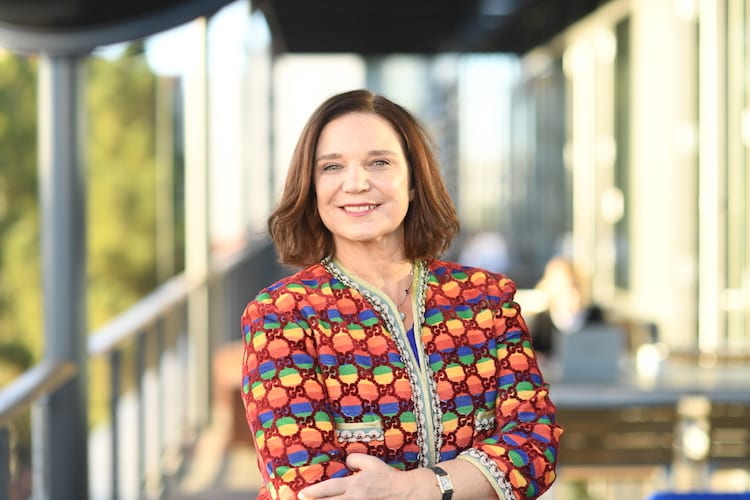
Renowned Wharton Economist and Berkeley Alumna Ann E. Harrison, BA 82 (economics and history), will begin her tenure as new Haas dean on Jan. 1, 2019.
Harrison is the William H. Wurster Professor of Multinational Management and Professor of Business Economics and Public Policy at the University of Pennsylvania’s Wharton School. Before joining the Wharton School in 2012, Harrison served as director of development policy at the World Bank.
Harrison has deep Berkeley roots. She’s been both student and teacher here, serving as a professor in Agricultural Resource Economics from 2001 to 2011. She joins an esteemed group of female economists who have made their impact on Haas, including Interim and former Dean Laura Tyson and Prof. Emeritus Janet Yellen, the former head of the Federal Reserve and now a distinguished fellow at the Brookings Institute.
In recent weeks, Harrison has been meeting with Haas faculty and staff, developing her priorities and vision for the school. She recently sat with Berkeley Haas News for an interview.
Haas: Could you tell us a little bit about yourself and your background?
Ann Harrison: I was born in France, and I came to the U.S. when I was 2 years old, grew up in the Bay Area in California, and went to UC Berkeley as an undergraduate. I am married to another economist who I met in graduate school. He’s originally from the Philippines, so we were married in Manila. We have two daughters: Alice goes to UC Santa Barbara, and Emily is a graduate student in art history.
In my free time, I love to hike all over California—in Point Reyes, at Inspiration Point in the Berkeley hills behind the university, and in the Sierra Nevada mountains.
Could you share a few career highlights? What award or research project are you most proud of?
One of my most precious moments was when I received a phone call from Berkeley asking me if I would be interested in a tenured professorship. I just remember how thrilled I was when I received that phone call. More recently, one of my happiest moments was when I received the Sun Yefang Prize, which is awarded by the Chinese Academy of Social Sciences for the best research in economics on China.
Tell us a little more about your experience at the World Bank and what you did there.
I started at the World Bank right after my PhD, and have spent time going back and forth between the World Bank and different academic positions I’ve held over the years. In my most recent role there, I served as director of development policy. The World Bank’s mission is to try to free the world from poverty. I have also worked with other organizations such as the United Nations on similar goals.
What do you think are some of the Haas School’s greatest strengths?
The school has a number of really important strengths. It’s defined by its unique culture and the four Defining Leadership Principles, which are helping to create students who care about becoming great business leaders, who go beyond themselves, who are confident without having an attitude, and who question the status quo. Berkeley is a phenomenal institution, and its location brings with it a tremendous entrepreneurial culture.
What do you see as some of its challenges?
As a public institution, we have a much more limited budget than many private universities, and that continues to be a challenge for the students, the staff, and the faculty. But we are so enriched by the generosity of all of our donors, including those alumni who made enormous contributions to create our new building, Chou Hall. Berkeley has a very loyal set of donors and alumni, and I really look forward to working with them in the years to come.
What will your key priorities be as you begin your deanship?
I am very honored to have been asked to serve as dean of Berkeley Haas. This is a dream come true for me. It is also my good fortune to succeed outstanding deans—such as Rich Lyons and Laura Tyson—who have done an amazing job in strengthening our school and placing it at the forefront of business education. I plan to build on their successes to make this great school even better.
As I begin my deanship, I have three priorities: One is to grow the faculty in certain key areas, which include entrepreneurship, data analytics, and green business. I also want to further integrate Haas into the Berkeley community by increasing the number of cross-school programs that we have. My third priority is increasing the diversity of the student body and the faculty. As you know, we have put together a new action plan, which will allow us to increase the diversity of our full-time MBA program. But the role of diversity and the importance of inclusion is something that permeates all our degree programs, and that is very important to all us.
Why did you decide to move to a dean’s role versus teaching and research?
All my life, I have enjoyed research and learning and writing, but I’ve also really enjoyed making a difference. Working at the World Bank was an important opportunity for me to be in the real world and to see governments change—such as lending the Indian government a billion dollars to help them clean up its rivers. As a dean, one is able to combine the joy of research and teaching with actually making change, so that’s an incredibly exciting opportunity for me.